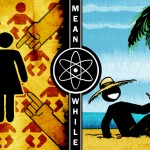Each week in The Female Gaze, Faith Newport engages the trends, events, and issues that affect women—and the men who care about them.
In the aftermath of Amendment One passing in North Carolina, there’s been a lot of talk about how it impacts homosexual couples. Some people have grieved the way Christian responses may be unfriendly, and others have celebrated what they see as a victory for their values. Or maybe some of us are just trying to figure out where we stand on an increasingly tricky issue.
In all this discussion, something important is getting left out.
Although Amendment One does prevent gay marriage from becoming legal in the state, it also eliminates civil unions and domestic partnerships—leaving the door open to potentially harmful ramifications for unmarried heterosexual couples as well. This document explains one legal perspective on the issue, and breaks down the possible consequences of the amendment.
Part of the controversy surrounding the legislature is due to its vague language. It has yet to be seen what the effects may actually be, and that leaves North Carolinians potentially vulnerable to troubles like those suffered by Ohio families when similar legislature passed in that state.
I find that deeply troubling. The reality is that long-term relationships can and do occur outside of marriage. Not only do the statistics reflect it, but my personal experience has backed it up—for every friend I have who’s recently been engaged or married, I know someone else who moved in with a boyfriend. These are real relationships that affect real women, whether the government recognizes it or not.
Women still get pregnant.
Women still end up victims of domestic abuse, whether physical, sexual, or emotional.
Women are still more likely to sacrifice time and energy to care for children and domestic responsibilities.
Women still need a safe, empowering way to leave their relationships.
Women still need legal recourse to prevent themselves from becoming victims, or to right wrongs that may have already occurred.
They still need health insurance, and so do their kids.
It seems to me that one potential first step would be to recognize that these women exist. To recognize that society is shifting, and that movement created a new group of people that have needs and are worthy of compassion and protection—just like any woman in the same situation who happens to be married. Sociologically, the dramatic social changes of the past century that have brought us here, to a point where non-marital coupledom is so common, are a unique phenomenon, and it’s not surprising that we haven’t quite figured out the best way to handle them yet.
However, it should surprise us that we are, in effect, moving backward. Recognizing civil unions and domestic partnerships played a part in creating societal order for these circumstances, and gave us a framework for understanding them and how they should be handled. These changes in North Carolina have left a lot of people with uncertainty and insecurity about the potential implications for their lives.
It may feel righteous to say that anyone concerned should just get married. But the reality is that not everyone will. And it won’t just be the men and women who “shacked up” that will feel the consequences—their children will hurt the most.











